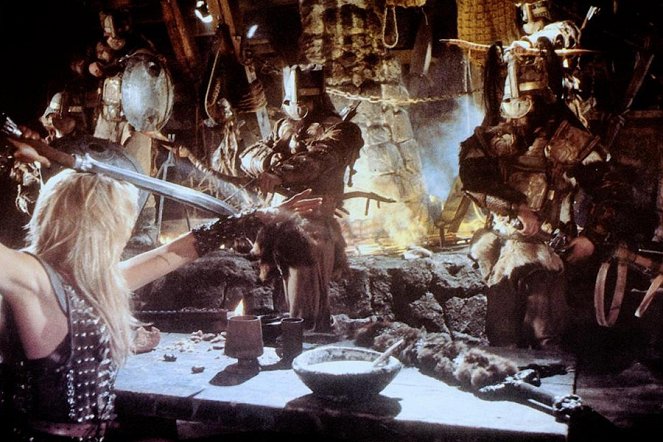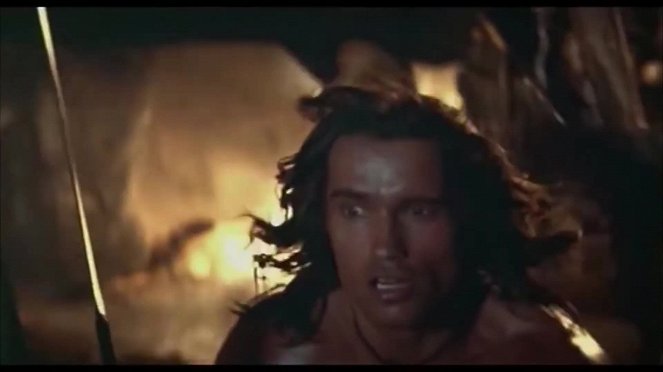Réalisation:
John MiliusPhotographie:
Duke CallaghanMusique:
Basil PoledourisActeurs·trices:
Arnold Schwarzenegger, James Earl Jones, Max von Sydow, Sandahl Bergman, Ben Davidson, Mako, Valérie Quennessen, William Smith, Franco Columbu (plus)Résumés(1)
En d'autres temps, en d'autres lieux. Seul rescapé du massacre de sa famille par le cruel Thulsa Doom, prêtre sanguinaire du culte du serpent, le jeune Conan est vendu comme esclave. Les années passent, transformant le jeune cimmérien en homme fort et puissant. Conan acquiert alors des connaissances dans l'art du combat et devient un barbare cruel et féroce, affrontant les adversaires les plus impitoyables pour le seul plaisir de ses maîtres. Au prix de ces combats, Conan gagne sa liberté. Enfin libre le puissant guerrier se met à la recherche de Thulsa Doom afin de réclamer vengeance... (texte officiel du distributeur)
(plus)Vidéo (1)
Critiques (11)
Le premier quart d'heure est un excellent prologue. Cependant, ce prologue ne semble jamais se terminer et le film se révèle être un clip vidéo de deux heures, ennuyeux et sans âme mais esthétiquement agréable, avec une bande originale unique de Basila Poledourisa. Un film où chaque plan dure cinq fois plus longtemps que nécessaire.
()
Weapons clanging and blood splattering in a monumental-looking, fantasy film. Arnold’s acting may be as stiff as a month-old load of bread, but I can't imagine anyone else as Conan. The film has a wonderful atmosphere of ancient times and Robert Howard can rest in his grave. What elevates it to almost a work of art is the – amazing, wonderful, fantastic, brilliant, monumental (take your pick) – soundtrack by Basil Poledouris. I haven't heard, and probably won't hear, anything better in the field of film soundtracks, and it's not just my opinion. If you haven't heard it, or don't have the CD, definitely get it and just enjoy it.
()
Arnie in a strong silent type role that he was born for, supported by the unforgettable, atmosphere creating music by Basil Poledouris (one of the best cases of linking music and picture that I have ever heard/seen). And in fact, almost all the characters are silent. And in the end, isn’t this better than the empty prattling that we know from most movies nowadays? And that isn’t just my nostalgic blindness speaking, from the days when I watched Conan’s movie adventures for the first time. To this day I remember hassling my father for a whole week to record it on VHS. Not to speak of the delight I felt when at last I got my hands on a DVD version, so I could watch it in the original format and with the original English language soundtrack. One of the movies that was murdered by the 4/3 format. P.S.: I’m pleased that I’m not the only one to notice that some scenes seem like they came straight out of Alexander Nevsky. ♫ OST score: 5/5
()
A film of truly barbaric qualities. Terrible acting, primitive directing, trivial story, excellent musical accompaniment... All of this brings together a completely unique atmosphere, which goes with the subject like a sword in the chest. What is the use if the fights are built more like a fitness demonstration of Arnie's muscles, what is the point if only the demonic James Earl Jones’s performance is the only decent one...? Milius's Conan remains a fearless war cult among fantasy films because, despite all the objectively visible flaws (and there are as many of them as there are naked women in Thul's harem), it retains a special pagan charm. Which doesn't change the fact that the film is actually quite lousy...
()
The first Conan film was a hit in its time and kicked off a wave of fantasy movies in the 1980s. However, none of the films that followed achieved similar success and if they enjoy any popularity today, it is as campy artifacts watched ironically. By comparison, Conan the Barbarian may seem slightly dated in its pacing today, but it is still fascinating thanks to its unique take on not only the heroic fantasy genre, but also its most iconic character. Unsurprisingly, the reason for this is the director and screenwriter, John Milius, who was lauded by Spielberg, Lucas and Coppola as the best storyteller of the New Hollywood generation. Milius created a reticent epic told primarily through images and the phenomenal myth-making music of Basil Poledouris. When the characters do express themselves verbally, it is mainly through monologues laden with melancholic poeticism (Osric, Valerie) or raw philosophy (Thulsa). As indicated by one of the film’s few dialogue scenes, as well as by a rare light-hearted exchange between Conan and Subotai, Milius peppered the narrative with vulgar theology and based the whole ethos of barbaric heroism on the opposition between the human and divine worlds. The main storyline thus inevitably leads to the brutally manual overthrow of the demigod who controls the minds of his followers. Milius’s Conan is no virtuous hero, but rather a properly superficial hedonist. Though we see him in a sombre thinker’s pose a few times during the film, behind his expression we sense emptiness rather than existential depth. His life is dedicated to instant gratification and mindless, brutal revenge, not to contemplating life or the death that he sows. It’s possible to draw the conclusion that the acting performances criticised by some are an intentional part of Milius’s uncompromising vision of a coherent pagan world. Conversely, the casting of the individual characters proves to be wonderfully ambitious and accurate in terms of type – from the elephantine non-actors and the statuesque though not superficially attractive women to the impressively multifaceted James Earl Jones. At its core, Conan the Barbarian is a typically Miliusian and thus a fiercely obstinate and insolently shallow rebuff of the high-concept blockbusters of the New Hollywood, while being not only a contemporary of such films, but also one of them. It belongs among them not only due to its director’s resumé and connections, but also as a creatively distinctive modern revitalisation of an old genre. Except Milius doesn’t look at old adventures with naïve nostalgia like Spielberg or Lucas and he doesn’t want to create modern equivalents of captivating flicks with swashbucklers in the mould of Errol Flynn. Instead, he serves viewers a brutal barbarian epic with a clumsy conqueror who was destined to become king (of Hollywood) through his own efforts. ___ PS: Not to mention the fact that Milius conceived Conan the Barbarian for the cinema. His raw epic about the clash of brute force and religion cannot be adequately put across anywhere else. Only on the big screen can one fully appreciate the film’s grandiose vignettes, which mirror the visual inspiration of (fantasy) epics ranging from Masaki Kobayashi’s Kaidan to Alexander Ptushko's Ilya Muromets in the spirit of the New Hollywood.
()
(moins)
(plus)
Photos (159)
Photo © Universal Pictures



Annonces